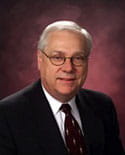Editor's Note: This article is part of an online symposium, "Does Seminary Have a Future?" hosted at Patheos this month. Read other perspectives here.
 Dan Aleshire is the Executive Director of The Association of Theological Schools. ATS is a membership organization of more than 260 graduate schools in the United States and Canada that conduct post-baccalaureate professional and academic degree programs to educate persons for the practice of ministry and for teaching and research in the theological disciplines. The Commission on Accrediting of ATS accredits the schools, approves the degree programs they offer, gathers strategic information from the schools, and explores critical issues in theological education. Of the 260 schools, they represent a diverse constituency including mainline Protestant, evangelical (including several Pentecostal schools), and Catholic and Orthodox.
Dan Aleshire is the Executive Director of The Association of Theological Schools. ATS is a membership organization of more than 260 graduate schools in the United States and Canada that conduct post-baccalaureate professional and academic degree programs to educate persons for the practice of ministry and for teaching and research in the theological disciplines. The Commission on Accrediting of ATS accredits the schools, approves the degree programs they offer, gathers strategic information from the schools, and explores critical issues in theological education. Of the 260 schools, they represent a diverse constituency including mainline Protestant, evangelical (including several Pentecostal schools), and Catholic and Orthodox.
Robert Crosby, a Patheos columnist (Catch the Current) and Professor of Practical Theology at Southeastern University had the opportunity recently to interview Daniel Aleshire, Executive Director of The Association of Theological Schools, on "The Future of the Seminary." Patheos is delighted to add his thoughts and observations to the dialog of this online symposium.
Robert Crosby: What are the most significant changes you see coming to seminary education?
Dan Aleshire: I would have to say it is the accumulating diversity—of students, of educational practices, and of the constituency served by ATS schools. The schools are doing more different kinds of education today than ever before. There was a time when the M.Div. was the dominant degree. The number and kinds of degrees have been increasing significantly. There was also a time when schools served primarily people from their own ecclesial family (tribe); now they serve many others.
The critical issue now is trying to figure out how relatively small schools will bend and accommodate the increasingly wide range of educational and other expectations. There is no one common story for all theological education. What is happening with Roman Catholic education is a little different than the Evangelical schools. A reality the Catholics are facing right now is that by 2030 the majority of the Roman Catholic population is going to be Hispanic. So, their challenge is how to train for churches that are half-Anglo and half-Hispanic—changes such as conducting liturgies in English and Spanish.
How well do seminaries tend to deal with change? What are some reasons for this?
Change is generally tough in ATS schools; tough because these are institutions and, thus, an important part of their task is a conserving function. Theological education carries forward the studies of the New Testament and how it was used for the last 1800 years. Most of the schools have a system of tenure, which means faculties don't turn over readily.
The schools don't have a lot of money sitting around so if change requires an investment, then that money has to be raised. In short: Change is rapid in congregations; it is less rapid, but faster in denominations; but then, seminaries are slower than both of them combined. Seminaries are caretakers of history.
Many faculty in ATS schools spent time in congregation ministry, but that was some time ago for many of them. And, the nature of ministry has changed so radically. Seminaries are organizations built for stability. They are more built to endure changes, than make them. At this point the church looks at the seminary as being stubborn and recalcitrant, but if the church ever gets into a fight over the doctrine the Trinity they will want something solid to turn to like the folks at a seminary.
How has the economic recession of the past few years impacted seminaries?
It has been as painful for most of them as it has been for the American population as a whole. ATS schools overall derive about one-third of their revenue from endowments, one-third from current gifts, and about one-third from tuition.
When the market turned down it affected both how much the schools could draw from their endowments and the resources their donors had for contributions—that's two-thirds of the revenue of the schools. The result of less revenue in the schools was frozen salaries, eliminated positions, and changed retirement programs. As the economy has recovered, at least a little, spending has been pretty flat. But, students are still paying tuition.





